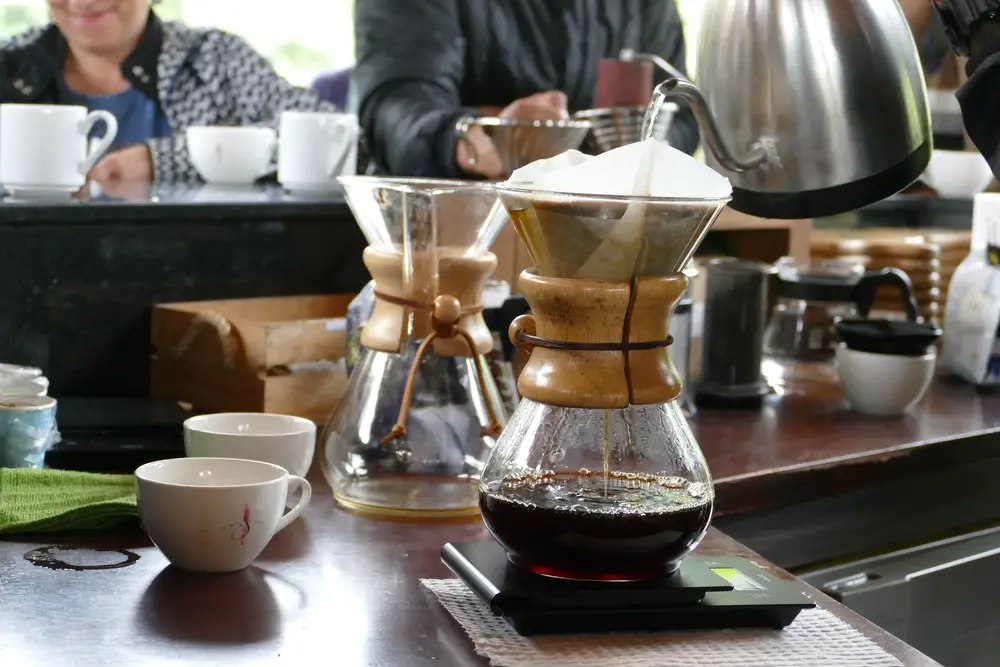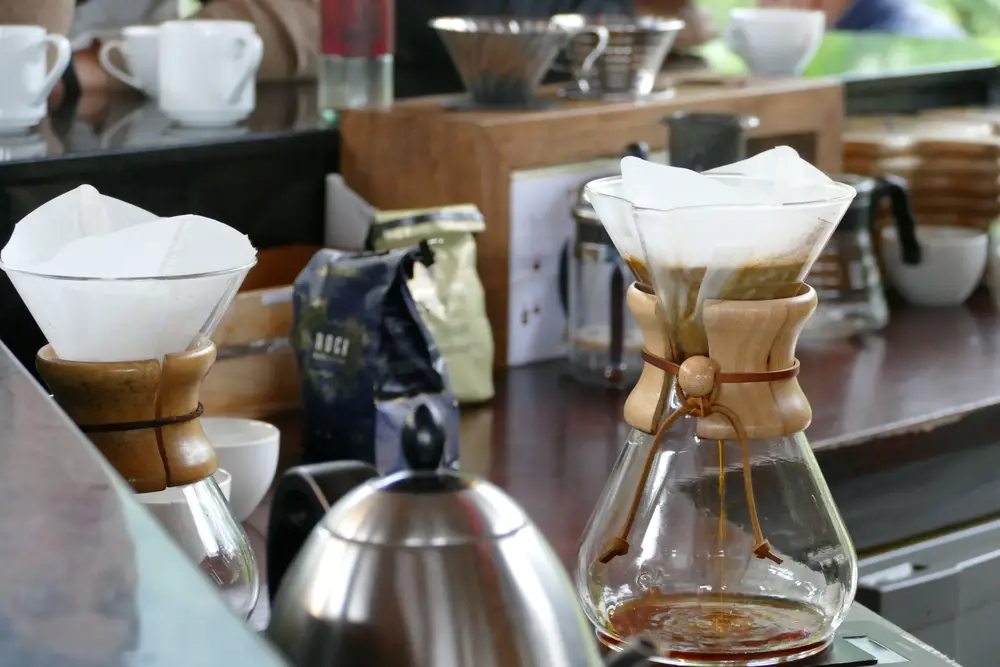Coffee can sometimes be quite bitter. You can find out why this is and how you can change it here.
Table of Contents
What is bitterness?
Bitterness is one of the basic tastes, along with sweet, sour, unami (Japanese flavor variant), and salty. She’s probably the most awkward of them all.
Bitterness can be sensed thanks to the taste buds located at the back of the tongue.
It is known that the sensory cells of our tongue contain a large number of proteins, around 35 of which react with the compounds in food to produce the sensation of bitterness.
One could say that the chlorogenic acids, which belong to the phenolic compounds, are particularly responsible for the bitterness of coffee.
Is bitter taste bad?
Not only is the bitter taste bad, you also have to remember that the bitterness is necessary so that the coffee is not too sweet or too sour.
It’s all about finding the perfect balance, allowing the bitter taste to complement the other flavors.
However, bitterness in general can also be a warning signal and an indication of the toxicity of food.
Should coffee be bitter or not?
First of all, you have to know that every coffee has a bitter component, even if it is not perceptible to everyone.
From this point of view, you must remember that there are coffees where sweetness predominates, others where saltiness predominates, still others where acidity predominates, and still others where bitterness undoubtedly predominates.
We can’t deny that coffee’s bitterness can be unpleasant at first, but can become pleasant over time.
Which types of coffee taste less bitter?
When a higher percentage of solids are extracted from the bean, the bitterness is greater. Therefore, drinks with a low degree of extraction such as Cold Brew less bitter.
Does specialty coffee have less bitterness?
In the specialty coffee industry, one finds aromatic, balanced beverages without a bitter taste.
Only high-quality coffee that has been processed with the utmost care is used for specialty coffee.
Robusta taste more bitter than Arabica?
Robusta variety is more bitter than Arabica because it has a higher concentration of bitter substances, chlorogenic acid lactones and phenylindanes.
Robusta also has a higher caffeine content, which further increases the level of bitterness. Robusta also produces a greater amount of crema, which can add to the coffee’s bitterness.
Ways to reduce bitterness in coffee
Use medium roast coffee. Medium roast coffee tends to taste less bitter than dark roast coffee. This is because medium roast coffee is roasted at a lower temperature and for a shorter time than dark coffee.
For example, medium roast coffees tend to have a stronger aroma, more acidity, and less bitter taste than darker roast coffees.
It’s best if you can buy medium roast coffee beans and brew your own coffee at home, or go straight to a coffee shop and look for a medium roast coffee.
Some coffee-growing regions are known for their bitter taste:
Avoid using instant coffee
Instant coffee helps us save time in preparation, but it can be too bitter because it contains additives, preservatives, and low-quality beans.
Decaffeination reduces the bitter taste. That’s why you should ask for decaffeinated coffee at your nearest coffee shop or buy decaffeinated coffee beans to prepare your coffee at home.
Change the size of the coffee grounds
If you’re making your own coffee at home, try experimenting with the grind size of the coffee grounds, depending on the brewing method you’ll be using. Ideally, you should be able to find the right grind size to improve the coffee’s bitterness.
Make sure the water you use is not too hot: If you make your own coffee at home, you should not use too much hot water, as this can also lead to a bitter taste.
Do not forget:
- The water temperature should be between 90°C (195°F) and 96°C (205°F).
- Water should not boil above 98°C (210°F).
- The water must sit in the kettle for a few minutes to lower the temperature before pouring it over the ground coffee.
Store leftover coffee in a thermos
If you use the flask coffee method, you should store the leftover coffee in a thermos to keep it warm.
If you leave the coffee in the coffee maker, it will become more bitter as it sits longer with the ground coffee.
Add milk or cream to the coffee
Add cream or milk to your coffee to reduce the bitter taste. This is a good option as the fat in the cream and milk is very good at counteracting the bitter taste of the coffee.
Put sugar in the coffee
You can soften the bitter taste of the coffee with a teaspoon of sugar. Cane sugar is best suited as it usually contains fewer additives.
You should clean the brew group very well after use. If you don’t do this, remnants of the coffee grounds can fall into the next cup of coffee, adding to the bitter taste.
It is important that you rinse the machine off with cold water.
Add a pinch of salt to the coffee
You can add a pinch of salt to the coffee to reduce the bitter taste. A small amount of salt does not make the coffee saltier or affect the other flavors.
Adjust brewing time
If you steep a coffee for too long, it can taste bitter. The longer the brewing time, the more extraction, and the more extraction, the more bitter the coffee will be.
The ideal is to reach a point where all the oils, sugars, acids, and other organic compounds can mix together to create a quality cup of coffee.
Make sure you buy quality beans
Beans that cost less money usually have a defect that reduces their value.
Coffee made from these beans tends to taste bitter, which is something to consider if you’re looking to save money.
Add citrus fruits
A squeeze of lemon or a few slices of citrus fruit can balance the coffee’s bitterness.
Use filter coffee
Filter coffee has a less bitter taste than other methods of preparation such as espresso or a piston coffee machine.
However, keep in mind that the bitter taste also depends on other factors such as the roasting method and the type of beans used.
Poor-quality water contains chemicals, harsh minerals, and other compounds that can alter the taste of coffee, making it more bitter.
To avoid this disadvantage, you should opt for spring water or filtered water instead of using tap water to brew your coffee.
Choose the right preparation method
If you brew the coffee with a French press, you will likely end up with a more bitter coffee, while drip brewing can help reduce the bitter taste.
Add cinnamon
Adding cinnamon can reduce the bitterness of the coffee as the taste buds focus on the sweetness.
Grind coarser
The coffee tastes bitter because the grind may be too fine. Don’t forget that finer coffee particles extract the flavors and organic compounds faster.
Because of this, you should try to grind the coffee coarser to get larger particles and thus slow down the extraction process.
Conclusion
Bitterness becomes a problem when it dominates the flavor of the coffee. However, there are many ways to reduce the bitter taste of your favorite beverage. Try some of the above and find the perfect balance.



